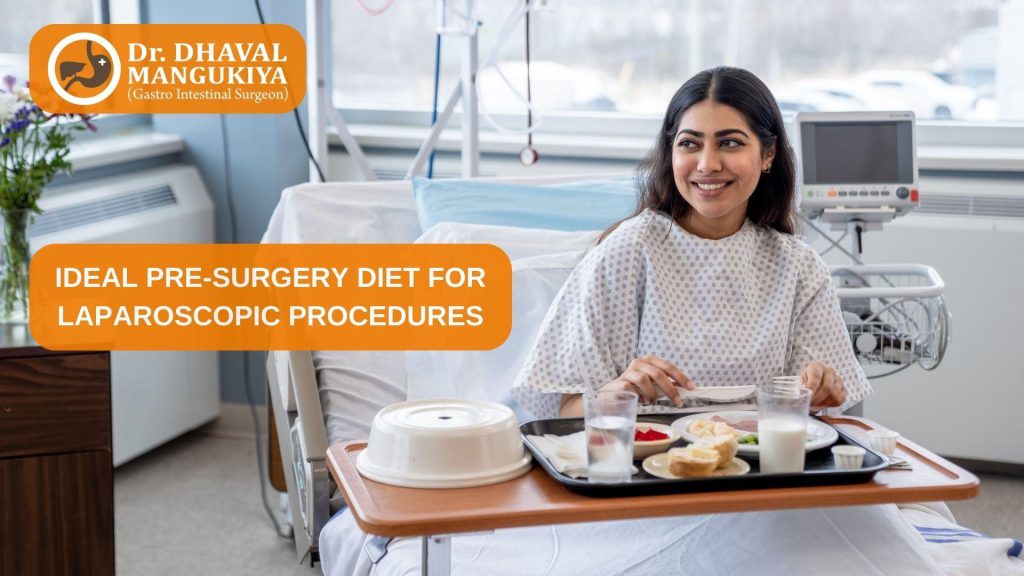Facing laparoscopic surgery involves not only mental and emotional preparation but also a strategic approach to your preoperative diet. A well-balanced and nourishing diet can contribute significantly to a smoother surgical experience and faster recovery. In this exploration, we’ll delve into the key components of the ideal pre-surgery diet, as recommended by Dr Dhaval Mangukiya — one of the best laparoscopic surgeons in Surat, for laparoscopic procedures, offering insights into how nutrition can play a pivotal role in optimizing your body for the journey ahead.
1. Prioritize Protein for Tissue Repair and Immune Support
Protein is a cornerstone of any pre-surgery diet, and it takes on heightened importance when preparing for laparoscopic surgery. Protein is essential for tissue repair, making it crucial for healing incisions and recovering from the physiological stress of surgery. Additionally, some of the best gastrointestinal surgeons in Surat share the opinion that protein plays a key role in supporting the immune system, which is vital for preventing infections post-surgery.
Incorporate lean protein sources into your meals, such as poultry, fish, tofu, legumes, and low-fat dairy. Consider spreading protein intake throughout the day to ensure a steady supply of amino acids for optimal tissue repair and immune function.
2. Load Up on Nutrient-Rich Foods for Overall Health
A well-rounded pre-surgery diet should include a variety of nutrient-dense foods to provide essential vitamins and minerals. Focus on colourful fruits and vegetables, whole grains, and nuts to ensure you’re getting a spectrum of nutrients that support overall health.
According to the best stomach surgeons in Surat, Vitamins such as A, C, and D, as well as minerals like zinc and selenium, play vital roles in immune function and wound healing. A diverse and colourful plate ensures you’re covering a broad range of micronutrients that contribute to your body’s resilience and ability to recover.
3. Hydrate, Hydrate, Hydrate
Proper hydration is often underestimated but is critical for optimal bodily functions, especially when preparing for surgery. Adequate fluid intake helps maintain blood volume, supports digestion, and aids in the elimination of waste products from the body.
Some of the best laparoscopic surgeons advise their patients to drink plenty of water in the days leading up to your laparoscopic surgery. Limit the intake of caffeinated and sugary beverages, as they can contribute to dehydration. Staying well-hydrated ensures your body is in the best possible state for the physiological demands of surgery.
4. Consider Complex Carbohydrates for Sustained Energy
Complex carbohydrates serve as an excellent source of sustained energy, providing a steady release of glucose into the bloodstream. This is particularly important in the lead-up to laparoscopic surgery, where maintaining stable blood sugar levels can contribute to overall well-being.
Incorporate whole grains such as brown rice, quinoa, and oats into your meals. These complex carbohydrates offer a sustained energy release, helping you stay nourished and energized without the peaks and crashes associated with simple sugars.
5. Moderate Fat Intake for Satiety and Nutrient Absorption
Minimize fat intake but make sure to include healthy fats. Choose healthy sources of fats such as avocados, nuts, seeds, and olive oil. Limit the intake of saturated and trans-fats, which can contribute to inflammation and may not be as supportive of the recovery process.
6. Minimize Processed Foods and Added Sugars
Steer clear of processed and high sugar foods. These types of foods can contribute to inflammation and may not provide the essential nutrients your body needs for optimal recovery. Instead to include fresh fruits and vegetables, lean proteins, and whole grains. Minimizing processed foods supports your body’s ability to handle the physiological stress of surgery more effectively.
7. Be Mindful of Portion Sizes
Focus on nutrient-rich foods and be mindful of portion sizes. Consider dividing your daily food intake into smaller, more frequent meals to maintain a steady supply of nutrients without overwhelming your digestive system. This approach can be especially helpful in the 24 to 48 hours leading up to your laparoscopic surgery.
8. Limit Alcohol and Caffeine Intake
Both alcohol and excessive caffeine intake can have dehydrating effects on the body. In the days leading up to your laparoscopic surgery, it’s advisable to limit alcohol consumption and moderate your caffeine intake. Opt for hydrating beverages such as water, herbal teas, and clear broths to support your body’s fluid balance.
9. Discuss Dietary Supplements with Your Healthcare Team
While obtaining nutrients from whole foods is ideal, there are instances where dietary supplements may be recommended. Before incorporating any supplements into your pre-surgery diet, consult with your healthcare team. They can assess your individual needs and guide you on the appropriate use of supplements to complement your overall nutrition.
Conclusion:
The significance of a well-thought-out pre-surgery diet for laparoscopic surgery cannot be overstated. By prioritizing protein for tissue repair, loading up on nutrient-rich foods, staying hydrated, and being mindful of portion sizes, you set the stage for a more robust and resilient body. The choices you make in the days leading up to the procedure contribute not only to a smoother surgery experience but also to a more efficient and robust recovery.

